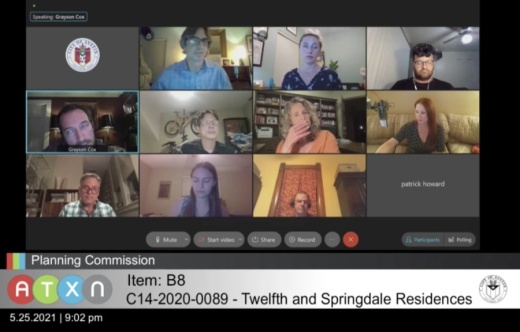The case heard before the citizen land use board centered on a permit request for the construction of a private park in a growing subdivision south of 51st Street between Springdale Road and US 183. The park outline prompted numerous calls from local residents to adjust or deny the plan, while also garnering support from those favoring an enhancement and gathering space for the eastern Austin neighborhood.
At issue in the case of the proposed 0.97-acre Senate Hills Park at 5406 Connally Lane was the Senate Hills Homeowners Association's request to see the park developed as a private place open only to residents of the surrounding neighborhood. Senate Hills is not a gated community, and the park would be accessible on public roads; HOA members and staff said plans to establish the park solely for local resident use only came after the city parks department elected not to link the site into Austin's public space system. With that decision made, progress on the park moved forward under the assumption it would be a private space.
The park is also to be constructed and insured into the future through an agreement with the adjacent neighborhood's developer, resulting in the improvement of a now-vacant lot into a free amenity for residents. Applicants said if the private designation were to be changed at this stage it would restart the entire planning process, possibly putting the agreement and the site's future in jeopardy.
Some speakers at the meeting said the plan had also garnered support from a majority of Senate Hills association members, and they were in favor of seeing an unused space turned into a site to foster a sense of community and improve local safety and recreation in the growing neighborhood.
“I’m into activating dead spaces and turning them into part of the community rather than just overgrown lots. I want to create spaces that we can share with our neighbors," supporter and neighbor Hillary Bentley said. "It is not currently engaged, and so just kind of whatever happens there, but this seems like a nice, purposeful idea. ... We just want a public place to hang out and meet our new neighbors.”
Several callers from in and around Senate Hills also expressed disapproval over the "privatization" of a local park. And expanding on concerns raised when the item was first considered by the planning board May 11, some community members and planning commissioners on May 25 also worried that a publicly accessible yet private park could result in the unintended consequence of fostering tensions between neighbors, unaware visitors—particularly people of color—and the police.
"Creating those new types of division within our community just doesn't make sense when it should have been so simple and easy to do this from the beginning," Commissioner Jeffrey Thompson said. "I realize that’s tough now ... but that’s the challenge of not bringing inclusivity and diversity from the beginning."
In the end, commissioners voted 8-2 in favor of the requested permit for the park. The approval came with conditions such as the construction of an accessible parking space, the clear posting of signage about the park's private nature and the availability of the park to outside groups with direct HOA approval.
Commissioner Grayson Cox said that while he believed shared sentiments over future enforcement at the site are valid, he did not support denying the community its requested benefit under an expectation that "assumes the worst out of people." Commissioner Awais Azhar, representing one of the votes against permitting, said he made his choice due to his views on the potential for lingering exclusion and public safety issues to rear up in the future.
“I’ve been followed in a store when I enter; I’ve been followed around in public space where I’ve gone. I just want to say these are true experiences, and there’s data to back that up," he said. "I hear that we should truly believe and aspire for the best in people, and I hope that truly we cannot regret this moment, but I also want to say that there is a very real possibility knowing what we know of how our society functions that there may very well be a day when we regret decisions that we make here.”





